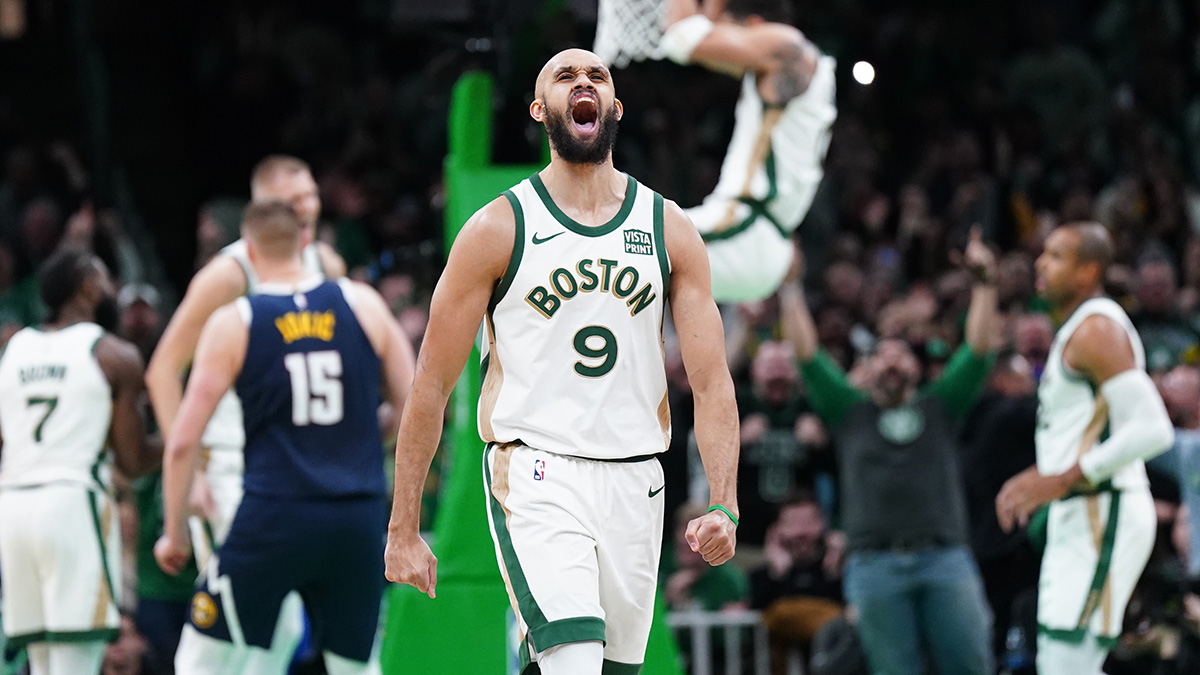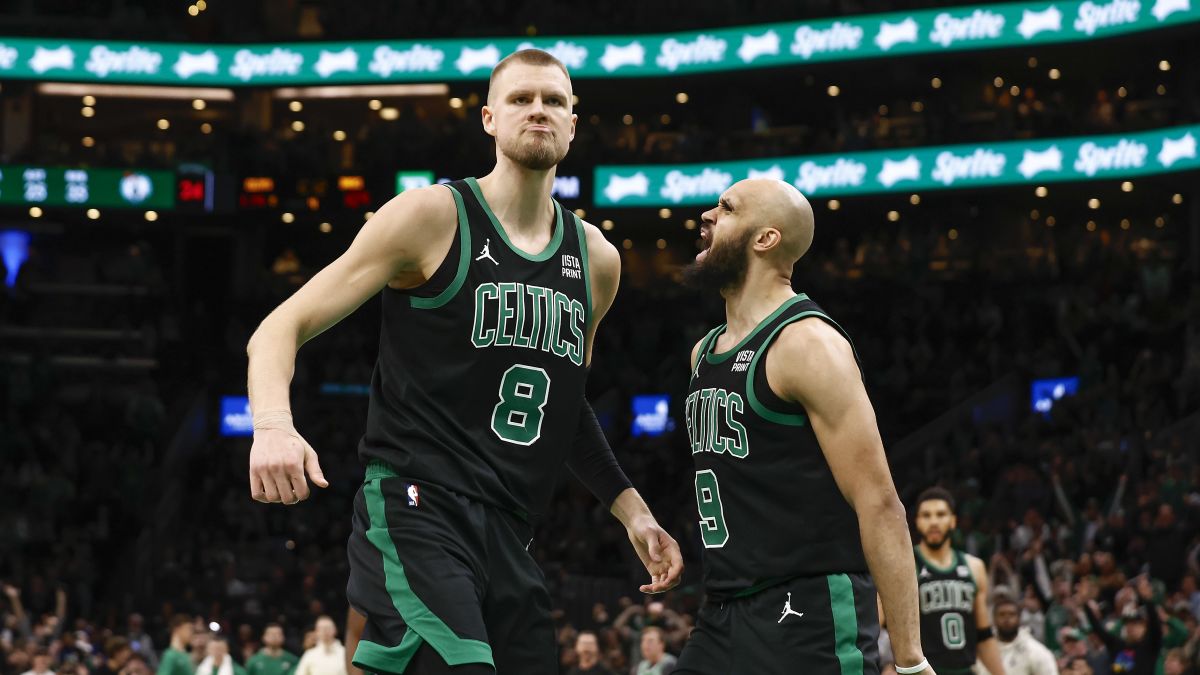
MIAMIRajon Rondo didn't have a triple-double for the Boston Celtics.
Heck, he failed to crack double digits in assists for only the third time in the C's 14 playoff games this year.
It was that kind of game for Rondo and the Boston Celtics as they dropped a 93-79 loss to the Miami Heat in Game One of the Eastern Conference finals.
Rondo finished with 16 points and nine rebounds, but only tallied six assists.
For most players, such numbers would be construed as having a pretty good game. But then again, most players don't mean as much to their team's success as Rondo means to the Celtics.
For the C's to have any shot at winning this series, Rondo has to play better - a lot better - than he did in Game 1. As you talk to one Heat player after another, they'll all tell you that limiting Rondo's impact will be the key to them winning this series.
"We have to be in tune with Rondo," said Heat forward LeBron James, who led all players with 32 points and 13 rebounds on Monday. "He's probably the number one unpredictable guy we have in our league as far as how he forces his action."
Boston Celtics
Rondo has shown the ability at times to take over games as a passer, scorer and rebounder.
On Monday, the All-Star point guard came up short on all those fronts.
"(Rajon Rondo) is the head of their team," said Miami's Mario Chalmers, the initial defender for the Heat on Rondo. "I was trying to make it a tough night for him."
Chalmers, with the help of teammates like James, were successful as Rondo shot 8-for-20 from the field and had four turnovers - all of which came in the first quarter.
But as is the case often on nights when Rondo struggled, he too played a role in his less-than-stellar play.
"He's got to be in attack (mode)," said C's coach Doc Rivers. "The second quarter he was attacking and attacking."
Because of that, the C's were able to wipe out a double digit deficit and go into the half tied at 46.
However, soon after that he began to seemingly focus more on trying to figure out the Heat defense, than simply make the necessary play.
"I thought he was reading a lot instead of playing on his instincts," Rivers said. "Sometimes his IQ hurts him at times. He's trying to read the defense. You can't read and play at that speed at the same time."
Of course, Monday's loss serves as a reminder of how so much of Rondo's success is predicated on whether his teammates can knock down shots.
Far too often, they came up short on Monday.
"We're human," Rondo says.
He's right.
Rondo's problems on Monday certainly played a role in Boston's Game 1 loss. But there were others. Here are some of the keys outlined prior to the game, and how they actually played out in Monday's Game One defeat for the Celtics.
WHAT TO LOOK FOR: Even with rosters filled with dynamic scorers, both teams will be hard-pressed to crack the 100-point barrier during this series. Both were among the top teams defensively during the regular season in terms of limiting opponents scoring. In the playoffs, it has been more of the same. Boston is giving up just 83.9 points per game, the fewest of any team in the playoffs this year. Right behind them is Miami, which is giving up just 85.5 points per game.
WHAT WE SAW: Points were indeed hard to come by for both teams, as each team went about trying to control the game's pace. For the most part, the scoring was indeed to the Heat's liking as Miami scored 10 points above the C's playoff average of points given up. "I didn't think we played great defensively, and we still held them to 93 points," Rivers said. "But at the pace the game was played, 93 felt like 110 because it was a slow-paced game."
MATCHUP TO WATCH: Brandon Bass vs. Shane Battier: This is one of the few head-to-head battles that on paper at least, appears to be a toss-up. Bass has a definite strength advantage over Battier and if you're the Celtics, you'd love for him to take advantage of it. But because he spends so much time - and with good reason - looking for his mid-range jumper, there's a good chance that this edge won't be utilized much at all. Battier has proven himself to be a better-than-average NBA defender. But most of his best work has come at defending small forwards who for the most part, aren't as strong as Bass.
WHAT WE SAW: This was a battle that was as decisively lopsided as any of the matchups among starters. Bass had eight points on 4-for-11 shooting, with just two rebounds. In addition to corralling just about every loose ball along with making damn near every hustle play under the sun, Battier emerged with a 10-point, 10-rebound double-double that was a major factor in Miami's victory. "I take a lot of pride in it (rebounding)," Battier said. "I have not had 10 rebounds in about three years."
PLAYER TO WATCH: Ray Allen didn't shoot the ball well against the Sixers, but he delivered a couple of 3-point bombs in the fourth quarter that in typical Ray Allen fashion, came right on time. Look for the Heat to play off Allen some in the game's early moments, just to see if he can pick up where he left off in Game Seven, or will he revert back to struggling to knock down open or lightly-contested shots.
WHAT WE SAW: Doc Rivers he has to do something about Ray Allen, who continues to struggle at both ends of the floor for the Celtics. The plan for now is to keep him in the starting lineup, but Rivers said he will look at ways to potentially shift around when he comes in and out of the game. "Ray is going to try and figure it out. We're going to try and figure out a way of even maybe subbing him differently to keep him strong," Rivers said. "Honestly, I don't know yet with Ray."
STAT TO TRACK: Miami is one of the highest scoring teams in the playoffs with a 95.5 points per game average which ranks fourth among postseason clubs. For Boston to keep the score more manageable, they have to limit the Heat's point production off turnovers. During the regular season, Miami averaged a league-best 19.7 points off turnovers. They're still at the top of the NBA heap in that category, averaging a league-high 18.9 points per game off turnovers. Meanwhile, the Celtics will try to keep the Heat relatively close to the C's postseason average in points allowed off turnovers, which is 13.8 points which ranks fifth among playoff teams.
WHAT WE SAW: The Celtics did a pretty good job of keeping turnovers low which in turn, meant fewer opportunities for the Heat to score in transition. Miami had 12 points off of Boston's turnovers, and had just 10 fast-break points for the game. Boston's poor free throw shooting (11-for-21) and inability to keep the Heat from scoring in the paint - Miami was 21 for 27 on field goal attempts in the paint - were far more critical in the game's outcome, than the C's turnovers and fast-break point totals.


